Podcast Season Five Top Tips
I am constantly blown away by the wonderful insights offered up during each of the podcast conversations I have. Therefore, from here on in, at the end of each season, I will share ten top tips with you that have stood out for me across the series. So, if you haven’t had the opportunity to listen to all the episodes you will still be able to access some of the learning.
Here goes, my ten top tips from Season Five:
Feed forward rather than feedback
“Feedback is the lunch of champions,” is a quote often attributed to Ken Blanchard who is an author, speaker, management expert, and business consultant. However, many of us find it challenging to give and/or receive feedback.
During our conversation Hulya explained why she prefers the term feed forward. For her, this term is less confrontational and allows her to view the information she is either giving or receiving as data, and this data offers up an opportunity to grow and step forward with newfound wisdom. Some may argue that it is just semantics, but the words we use are important. How much more comfortable is it to know you are providing another person with insight that can enable them to continue moving forward? Personally, I will always choose to use the term feed forward. That said, I am only human and after years of using the term feedback I do occasionally forget!
Trust and let go
Julie said that one of her biggest leadership lessons was learning how to trust and let go. How do you react when you’re faced with a problem? Do you grapple with it, believing you need to solve it because that’s your job? As a leader you need to resolve issues, right? Sometimes perhaps, but not always.
As Julie found out, her role wasn’t to solve the problem single-handedly, but to get out of the way and let her team take on the challenge. How do you feel about stepping away, trusting your team, and letting go? For many of us this a scary concept, but sometimes letting go and trusting the people around you is exactly what needs to happen – not just to solve the immediate problem but to give yourself and your team the opportunity to grow. This advice could feel counter-intuitive, but I would urge you to give it a go. Trust yourself, trust your team, trust the process.
Your organisational culture can provide competitive advantage
Yes, your company’s culture can provide you with competitive advantage although the journey to achieve cultural shift is not for the faint hearted. Culture is intangible and impacted by every aspect of a business. At the same time an organisation’s culture influences all parts of an organisation, its people, practices, and processes. It is a curious symbiotic relationship that can be difficult to change. However, cultural change in my experience is one of the most rewarding projects you can ever undertake.
Allan believes that a key component of his organisation’s culture is that it isn’t driven by shareholder profit. Of course, they need to generate profits, but their key focus is providing affordable accommodation for students. How would you assess the culture of your business? Does it give you competitive advantage? If not, what needs to change?
Looking to work with a coach, book a discovery call
Coaching is an awesome development tool. The first time I ever received coaching it blew me away and it was that experience which set me on the journey of self-discovery that I am still on today, nearly 20 years later. However, coaching isn’t something that should be entered into lightly. There is usually a significant investment in terms of both time and money. Julia beautifully describes the process of finding a coach, likening it to finding a pair of white shoes. She may be looking for a stunning pair of white stilettos with killer heels, whilst I might be looking for white trainers that can accommodate my bunions. Yes, we are both looking for white shoes, but our needs are very different (and just for reference, in this case, Julia’s analogy would be spot on).
If you are wanting to embark on a coaching adventure, Julia’s advice is to take your time and make sure you book a discovery call with anyone you think you might like to work with. As coaches, we understand the need to find the right coach for you so take advantage of the offer of a free 30-minute call. Don’t be afraid at the end of the call or afterwards to say no – we won’t be offended.
What other people call beliefs we call opinions but when we have a belief it’s the truth
When Jeremy made this statement, I laughed out loud because, much as I may want to dispute his wise words, it is the truth. What is your belief? Is it just Jeremy’s opinion? Comedians are great at making us laugh at our own idiosyncratic behaviour and whilst Jeremy is not a comedian, his words certainly caused me to reflect.
Agree or not with his statement, I am curious as to how our interactions and communications with other people would shift if we accepted that other people’s opinions were their truth. Would it make us more open and willing to understand their perspective and if not, would we at least try to find common ground? Would it make us more empathetic?
Listen with your mind, body, and soul
Listening is such a phenomenal skill to have whether or not you are a leader. Most of us would like to believe we are good listeners but often when we are having a conversation with someone, we are listening to respond not to truly understand what they are saying. Hulya talks about the need to listen with every part of our being and not only that, but to listen to what isn’t being said as well as what is. Much of our communication is non-verbal so if we truly want to listen to someone, we need to also pay attention to non-verbal cues.
When was the last time you were asked a question and gave the response you thought the person wanted to hear rather than really what was going on for you? The most common example of this, and one we can probably all relate to is the question “How are you?”. How many times have you answered, “I am fine, I am okay” when you are anything but fine, or okay? Like it or not, if we were listening with our entire being we would know that your answer wasn’t the truth.
How is your power ball, is it inflated or deflated?
Since setting up her own business, Julie has developed the power ball model which helps her clients look at all aspects of their business. The power ball is not owned by any one person - it is owned by everyone in the business, and conversations are driven by whether the power ball is inflated or deflated. It promotes collective responsibility and the idea that not one person or team are responsible for anything that happens in the business.
Whilst Julie predominantly uses this model with her entrepreneurial clients, I think it would work just as well in large organisations. Often in universities, a silo mentality is cited as a barrier to cross team working. Perhaps using the power ball model could break it down by encouraging collective accountability and discussion around whether the ball is inflated or deflated rather than focusing on the performance of an individual or team. I love this model and can really see the power in its simplicity. How about you, could the power ball help you and your team?
As leaders we must adapt and change, although our values remain constant
Having been with the same organisation for several years, Allan spoke of the importance of being able to adapt and change to whatever is going on in the environment around you. He realises how lucky he is to work for an organisation whose values align with his own, noting that whilst he has changed and adapted his values have remained the same. What a wonderful observation. Our values are intrinsic to who we are, and they provide us with our moral compass.
Do you know what your values are and how they align with the values of your organisation? What about the values of your team? What are your shared values? For me the starting point for anyone wishing to embark on a leadership journey, is to understand their values. It is ‘deep’ work but very much needed if you wish to climb high as a leader.
To get the most from coaching be honest and don’t be afraid to show your vulnerability
Yes, yes, yes. You have invested the time and money to undertake a coaching programme. Please don’t let your fear of being honest and/or showing your vulnerability hold you back from getting the most from this wonderful experience.
As Julia said, coaches are trained in creating safe spaces for their clients to talk about whatever is going on for them. To help you on your journey of self-discovery we stay away from judgement. As your coach we are in your corner, 100%. That doesn’t mean we won’t challenge your thinking or hold up a mirror so that you can truly see yourself. However, it is never done from a place of judgement. We do it with the intention of opening up your thinking, giving you time and space to consider your actions and behaviours. If you aren’t honest with your coach, then you will never gain as much as you could do from the coaching experience. As coaches we have supervisors, so we too need to be honest and show our vulnerability. If we don’t, we will never fulfil our potential as coaches.
Are your beliefs empowering you or disempowering you?
What a fabulous question. In any given situation, it is unlikely that we can change the circumstances, the situation is what it is. What we can change is our thoughts about the situation and ultimately what action we take as a result. There is not a single person on the planet who doesn’t have limiting beliefs. I am not good enough, I don’t deserve this, I’m not clever enough are just some examples of the most common limiting beliefs. The difference comes from how we choose to deal with them.
Are your beliefs empowering you to move forward and be the best leader you can be or are they disempowering and holding you back? As Jeremy demonstrated during our conversation, there are many ways to deal with limiting beliefs so don’t let your beliefs disempower you. Take back your power and start to use your thoughts to propel you forward on your leadership journey.
Five wonderful guests with great wisdom to share. A massive thank you to Hulya, Julie, Allan, Julia, and Jeremy for taking the time to chat with me and so generously sharing your skills and experience. I have highlighted just ten tips but there are plenty more contained within every episode of the Dive Deep, Climb High podcast. Click on the link below to listen to all previous episodes.
Dive deep. Climb high. Can-do leadership in a world of can’t.










